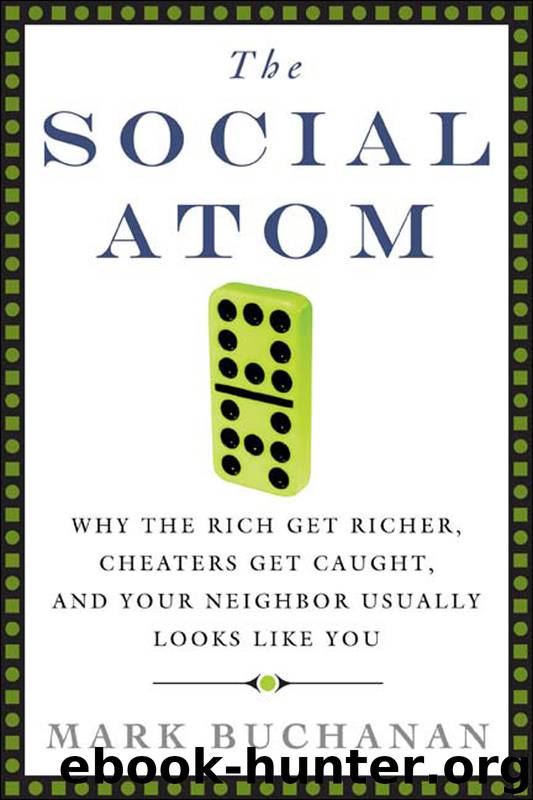The Social Atom by Mark Buchanan

Author:Mark Buchanan
Language: eng
Format: epub
Publisher: Bloomsbury Publishing Plc
Published: 2009-04-05T16:00:00+00:00
BEING A NICE GUY . . . SELFISHLY
The standard explanation of human cooperation rests entirely on the idea that we do things for others only because we hope to get something for ourselves. It is no surprise, of course, that two people cooperate when they both benefit immediately from doing so. If one farmer has two ploughs and a horse, and another has two horses and a plough, they can exchange horse for plough temporarily and both gain, without risk. But a lot of human cooperation requires the negotiation of tricky situations in which both parties stand to gain, yet also face a strong risk of being cheated. Even 250 years ago, the Scottish philosopher and historian David Hume put his finger on the nub of the dilemma:
Your corn is ripe today; mine will be so tomorrow. 'Tis profitable for us both, that I shou'd labour with you to-day, and that you shou'd aid me to-morrow. I have no kindness for you, and know you have as little for me. I will not, therefore, take any pains on your account; and should I labour with you upon my own account, in expectation of a return, I know I shou'd be disappointed, and that I shou'd in vain depend upon your gratitude. Here then I leave you to labour alone: You treat me in the same manner. The seasons change; and both of us lose our harvests for want of mutual confidence and security.6
This disastrous outcome is no surprise according to modern game theory, a mainstay of mathematical economics, which predicts that self-interested beings should always fail to cooperate under such circumstances. Essentially restating Hume's argument, the theory reasons as follows: If two strictly self-interested farmers face the harvest dilemma only once, the best outcome for either is to get his neighbor to help with his own harvest, without ever having to make a similar effort of his own. Knowing this, neither farmer will be willing to stick his neck out, laboring for his neighbor on the first day, as he knows he'll surely be cheated on the second day. So two farmers—if they meet only once, an important point as we shall see—will refuse to cooperate.7
But of course people do routinely cooperate in these kinds of situations. How they manage it, as social theorists well understand, is often by way of a mechanism for establishing and maintaining trust that biologists refer to as reciprocal altruism. In essence, everything changes if two people meet repeatedly. In the case of the farmers, they may face such harvest situations every year, as well as many similar farming problems in between times when mutual aid can be beneficial to both. In this case, treachery on the part of one farmer, in any encounter, comes at a high cost—the breakdown of trust and probable retaliation by the other farmer through his refusal to cooperate. Repetition changes the logic entirely, as it allows a kind of "discussion" to take place between the two parties. Each will continue to cooperate as long as the other does.
Download
This site does not store any files on its server. We only index and link to content provided by other sites. Please contact the content providers to delete copyright contents if any and email us, we'll remove relevant links or contents immediately.
The Complete Stick Figure Physics Tutorials by Allen Sarah(7361)
Secrets of Antigravity Propulsion: Tesla, UFOs, and Classified Aerospace Technology by Ph.D. Paul A. Laviolette(5363)
Thing Explainer by Randall Munroe(3930)
The River of Consciousness by Oliver Sacks(3592)
The Order of Time by Carlo Rovelli(3182)
How To by Randall Munroe(3101)
A Brief History of Time by Stephen Hawking(3017)
I Live in the Future & Here's How It Works by Nick Bilton(2979)
What If?: Serious Scientific Answers to Absurd Hypothetical Questions by Randall Munroe(2692)
The Great Unknown by Marcus du Sautoy(2687)
Midnight in Chernobyl by Adam Higginbotham(2537)
Blockchain: Ultimate Step By Step Guide To Understanding Blockchain Technology, Bitcoin Creation, and the future of Money (Novice to Expert) by Keizer Söze(2479)
Networks: An Introduction by Newman Mark(2402)
The Meaning of it All by Richard Feynman(2341)
Easy Electronics by Charles Platt(2325)
The Tao of Physics by Fritjof Capra(2266)
Midnight in Chernobyl: The Untold Story of the World's Greatest Nuclear Disaster by Adam Higginbotham(2217)
Introducing Relativity by Bruce Bassett(2114)
When by Daniel H Pink(2110)
